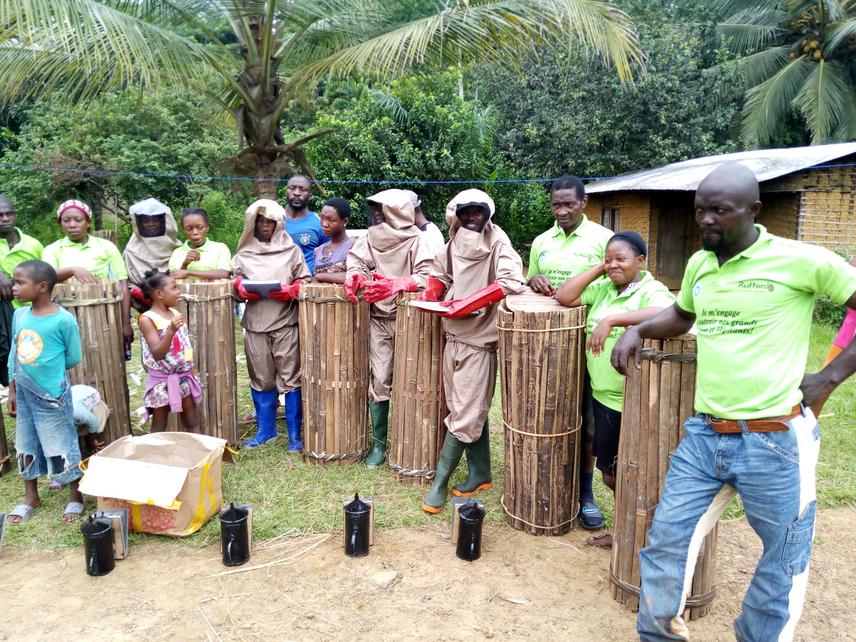Aghah Valery Binda
Other projects
29 Apr 2019
Communities and Conservationists: Protecting Great Apes and Elephants Together in the Campo Ma’an National Park, Cameroon
The main goal of this project is to advance conservation of great apes and African elephants in CMNP by addressing the root causes of illegal hunting, human-gorilla conflicts, and human-elephant conflicts. Specifically, the project will:
a) Promote environmentally responsible behaviour within communities surrounding the Park through environmental education and conservation awareness campaigns,
b) reaffirm positive attitudes towards elephants and gorillas, promoting a message of tolerance and understanding of the needs and intrinsic value of wild elephants and gorillas,
c) develop a business model for 142 hunters/farmers by building their capacity in sustainable commercial beekeeping, agroforestry and chili farming,
d) train six site-adjacent communities on safer farming practices and on how to use chili in combination with beehive fences to deter elephants and gorillas from farmlands thereby reducing crop raids that often result in huge economic losses and the retaliatory killing of elephants/gorillas.

Building indigenous peoples' capacity in beekeeping as a livelihood alternative to bushmeat around Campo Ma'an National Park. © Aghah Valery Binda
Although Campo Ma’an National Park (CMNP) is identified as a priority site for the conservation of forest elephants and two endangered great ape species - the western lowland gorilla and the central chimpanzee, these species remain threatened by poaching and retaliatory killings resulting from gorilla and elephant crop raiding during which farmers often experience great economic losses and in retaliation get these animals injured or killed. This project representing the second phase of our intervention aims at reducing these threats through research, conservation education, alternative livelihoods and introduction of sustainable techniques in deterring these animals from farmland.
Through the joined efforts of local communities, politicians and conservation experts, this project, which targets six site-adjacent villages, will reduce the threats of illegal bushmeat hunting and HECs/HGCs in CMNP by addressing their root causes. Through locally tailored radio programs, a wide audience (farmers, hunters, bushmeat consumers) will be educated on the devastating impacts of unsustainable bushmeat hunting especially of great apes, the far reaching implications of forest degradation and on relevant wildlife laws. Following conservation education/outreach guidelines tailored from Jacobson et al., (2006), we hope to foster sustainable behaviour, improve public support for conservation, reduce vandalism/poaching in the area, and influence policies and decisions that affect the forest and its natural resources. Regular visits to more HGC/HEC hotspots will be used to reaffirm positive attitudes towards elephants/gorillas, promoting a message of tolerance and understanding of the needs and intrinsic value of wild elephants/gorillas. In addition to three already existing clubs, three more clubs of 20 members each will be created, one from each of the villages of Onoyong, Oveng and Mabiogo (hotspots for HEC/HGC and bushmeat hunting). Clubs will now be called “Campo Ma’an Wildlife Guardians” (CMWG). All six clubs will have their capacity built in agroforestry and how to use chili in combination with beehive fences to deter elephants/gorillas. With agroforestry, early fruiting with increased yields per acre of farmland will reduce opening up of new farms hence reduced deforestation and less HGC/HEC. With improved beekeeping, there will be improved pollination hence, improved crop yield, thus reducing the need for larger farmlands (hence reduced encroachment into elephant/ gorilla habitats). Promoting the use of chili fences will help protect livelihoods, empower rural women, increase the food security of rural farmers, and help conserve elephants (Changa’a et al., 2016) and great apes especially as chili is of high demand in neighbouring markets.